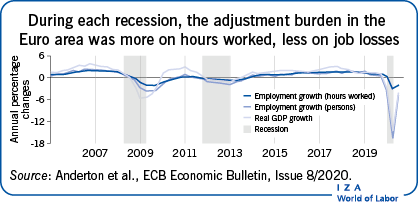Elevator pitch
Old and new EU member states still adopt quite different labor market institutions and policies: convergence has been partial and limited. Nevertheless, a new agreement is spreading on the importance of well-developed, coordinated institutions, supported by social dialogue, in view of the increasing challenges posed by the macro economy and by the increasing fragmentation of labor markets.

Key findings
Pros
In new EU member states, employment protection for temporary contracts has increased, converging towards that of older EU members.
Employment protection laws cushion the impact of negative macro shocks on workers’ incomes and reduce job losses.
If increased bargaining coverage is associated with greater bargaining coordination, this has positive effects on employment and price stability.
In fragmented labor markets, collective bargaining institutions may improve the functioning of labor markets.
Job retention schemes were widely promoted during the COVID-19 recession, providing a strong cushion against job losses.
Cons
Collective bargaining coverage has continued to decrease since 1985 in most European countries.
Expenditures on active labor market programs are contracting in old EU member states; they are constant but much lower in new members.
Until 2019, expenditures on unemployment benefits and related measures diminished throughout the EU.
Fragmentation of labor markets and increasing incidence of negative macro shocks pose hard challenges to labor market policies.
Some countries have not yet adopted provisions for adequate minimum wages nor for coordinating them with collective bargaining.